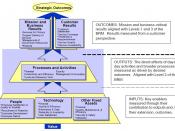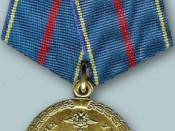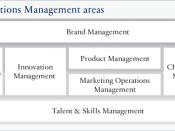IntroductionEffective management is accomplished through the four functions of management; planning, organizing, leading and controlling. Managers should apply the four functions pertaining to staffing, physical resources and information technology. These four functions of management impact the operations management theory which deals with the entire operations within an organization.
PlanningPlanning is selecting priorities, results, goals and objectives and how these results will be achieved (Skills and Practice). Planning typically includes identifying the goals, objectives and methods that are needed to be carried out. This step decides what has to happen in the future, then generates the most suitable action plan. Management needs to first decide the resources that are needed to ensure the objectives are met. Planning can be the most difficult step, but in the end can save time and money. Some examples of planning include project planning, staff planning, advertising, promotions and business planning.
OrganizingOrganizing consists of distributing and configuring resources to accomplish the goals and objectives that were established in the planning process (Skills and Practice).
In this process organizational charts or other various methods may be used to outline the practical responsibilities and a drawing of the resources needed. Organizing makes the best use of the available resources required to successfully carry out the plans. Management monitors and oversees the progress of each functional group and the allocated tasks. Example of organizing include; organizing work spaces, staffing and processes within the organization.
LeadingLeading consists of establishing command and influencing people to follow and pursue the decided direction by the manager. The manager will determine and track the functional teams and ensure his or her tasks have been carried out with accordance to the organizational goals. Within the leading role, management must necessitate the skills to motivate their employees and encourage high- performance.
ControllingThis is the coordinating, monitoring and adjusting the resources and processes to achieve the set goals and objectives in an operational and professional manner (Skills and Practice). Managers will track to ensure the necessary tasks have been implemented in accordance to the organizational goals. They also need to communicate with all employees the goals and strategies of the organization in order to keep them motivated and focused.
Operations Management TheoryOperations management deals with all the operations within an organization. The management includes a wide range of action and involves; quality control, logistic, evaluation, managing purchases, inventory control, product design and production control (Skills and Practice). Operations management is defined as the management system or processes that create good and /or provide service. It implements the policies and tasks needed to meet an organizations customers, employees, and management (Dictionary).
In order for an organization to be successful it must focus on the outcome, depending on the service provided and the product, it can largely vary. In healthcare, for example the product is the patient, making this service available in the market should be affordable and with high quality and high standards, this will win over patients. Primarily the organization should work towards designing the services they will provide based on the demand in the community. Producing something that is already there or provided by a nearby hospital is generally not going to create a successful hospital. The goal would be to plan for an appropriate location where the need is present and high quality care and standards will be achieved.
Healthcare operations managers play one of the most vital and significant roles in the delivery systems, the criteria for their success (or failure) may face problems. The critical role of the operations manager has been taken lightly in its development. The skills and characteristics of health care operations managers are defined. An effective operations manager must follow these defined functions in all clinical areas. Operations managers deliver to physicians and all others who deliver care the tools necessary to deliver that care. Without those tools, very little health care can be delivered.
Impact of Management Function on Operations ManagementPlanning is the most important function of operations management. An organization must plan the goals and set priorities, this will in turn allow management to decide and distribute the work load. If an organization lacks planning then they would not be aware of the outcome being achieved and has the potential to fail rather quickly. Planning decides what has to happen in the future and generating the action plan.
For the work to be conducted within the concept of operations management, organizing is the next step and plays an important role. This consists of distributing and configuring resources to accomplish the goals and objectives that were established in the planning process. Within this function, workload can be divided into appropriate division, skill and classifications. Organizing makes the best use of the available resources required to successfully carry out the plans. Management monitors and oversees the progress of each functional group and the delegated tasks.
Once the plan is in place and organizing has been completed, next is the management leading, establishing and influencing the direction of the staff. Employees need leaders who can communicate effectively and help guide them in the common goals they share. Management must necessitate the skills to motivate their employees and encourage high- performance. This in time can produce a high rate of production and a profitable organization.
The controlling function is the monitoring and changing resources in order to keep achieving the goals and objectives. This as the others plays an important role and successful managerial control must always be followed by ongoing feedback and correcting or updating the initial plans. If this function were removed, then the organization could not move forward or grow in the future.
ConclusionThe four different functions of management impact operations management theory within an organization daily. Effective management is accomplished through the four functions of management: planning, organizing, leading and controlling. The four functions are highly integrated when carried out day-today of running a successful organization (Skill and Practice). Planning, organizing, leading and controlling all must be carried out to meet the goals and objectives of the organization and are subject to change depending on the situation the organization is facing. Managers need to fulfill the skills to carry out the functions, make decisions about the goals and pursue the future.
Reference:Dictionary (2006). Retrieved January 8, 2007, from www.dictionary.comSkills and Practices in Organizational Management (2006). Retrieved January 8, 2007,from www.managementhelp.org


